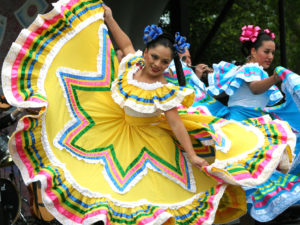Two days, people! We are two days away from everybody’s favorite excuse to start having margaritas at breakfast … okay, maybe that’s just me. All jokes aside, Cinco De Mayo is one of  those holidays that most people don’t actually understand or know the true meaning behind. I shared a portion of the following article in this month’s newsletter (have you signed up for it yet?) but wanted to share the entire piece written by History.com here.
those holidays that most people don’t actually understand or know the true meaning behind. I shared a portion of the following article in this month’s newsletter (have you signed up for it yet?) but wanted to share the entire piece written by History.com here.
“Cinco de Mayo, or the fifth of May, is a holiday that celebrates the date of the Mexican army’s 1862 victory over France at the Battle of Puebla during the Franco-Mexican War. Cinco de Mayo 2018 occurs on Saturday, May 5. A relatively minor holiday in Mexico, in the United States Cinco de Mayo has evolved into a commemoration of Mexican culture and heritage, particularly in areas with large Mexican-American populations.
Cinco de Mayo History
In 1861, Benito Juárez—a lawyer and member of the indigenous Zapotec tribe—was elected president of Mexico. At the time, the country was in financial ruin after years of internal strife, and the new president was forced to default on debt payments to European governments.
In response, France, Britain and Spain sent naval forces to Veracruz, Mexico, demanding repayment. Britain and Spain negotiated with Mexico and withdrew their forces.
France, however, ruled by Napoleon III, decided to use the opportunity to carve an empire out of Mexican territory. Late in 1861, a well-armed French fleet stormed Veracruz, landing a large force of troops and driving President Juárez and his government into retreat.
The Battle of Puebla
Certain that success would come swiftly, 6,000 French troops under General Charles Latrille de Lorencez set out to attack Puebla de Los Angeles, a small town in east-central Mexico. From his new headquarters in the north, Juárez rounded up a ragtag force of 2,000 loyal men—many of them either indigenous Mexicans or of mixed ancestry—and sent them to Puebla.
The vastly outnumbered and poorly supplied Mexicans, led by Texas-born General Ignacio Zaragoza, fortified the town and prepared for the French assault. On May 5, 1862, Lorencez gathered his army—supported by heavy artillery—before the city of Puebla and led an assault.
How Long Did the Battle of Puebla Last?
The battle lasted from daybreak to early evening, and when the French finally retreated they had lost nearly 500 soldiers. Fewer than 100 Mexicans had been killed in the clash.
Although not a major strategic win in the overall war against the French, Zaragoza’s success at the Battle of Puebla on May 5 represented a great symbolic victory for the Mexican government and bolstered the resistance movement. In 1867—thanks in part to military support and political pressure from the United States, which was finally in a position to aid its besieged neighbor after the end of the Civil War—France finally withdrew.
The same year, Austrian Archduke Ferdinand Maximilian, who had been installed as emperor of Mexico in 1864 by Napoleon, was captured and executed by Juárez’s forces. Puebla de Los Angeles was renamed for General Zaragoza, who died of typhoid fever months after his historic triumph there.
Cinco de Mayo in Mexico
Within Mexico, Cinco de Mayo is primarily observed in the state of Puebla, where Zaragoza’s unlikely victory occurred, although other parts of the country also take part in the celebration.
Traditions include military parades, recreations of the Battle of Puebla and other festive events. For many Mexicans, however, May 5 is a day like any other: It is not a federal holiday, so offices, banks and stores remain open.
Cinco de Mayo in the United States
In the United States, Cinco de Mayo is widely interpreted as a celebration of Mexican culture and heritage, particularly in areas with substantial Mexican-American populations.
Chicano activists raised awareness of the holiday in the 1960s, in part because they identified with the victory of indigenous Mexicans (such as Juárez) over European invaders during the Battle of Puebla.
Today, revelers mark the occasion with parades, parties, mariachi music, Mexican folk dancing and traditional foods such as tacos and mole poblano. Some of the largest festivals are held in Los Angeles, Chicago and Houston.
Confusion with Mexican Independence Day
Many people outside Mexico mistakenly believe that Cinco de Mayo is a celebration of Mexican independence, which was declared more than 50 years before the Battle of Puebla.
Independence Day in Mexico (Día de la Independencia) is commemorated on September 16, the anniversary of the revolutionary priest Miguel Hidalgo y Costilla’s famous “Grito de Dolores” (“Cry of Dolores”), a call to arms that amounted to a declaration of war against the Spanish colonial government in 1810.”
Learn anything?
Rebecca McKinney
I wanted to create this blog for a few reasons. First and foremost, to share tips, tricks, and knowledge about the food and beverage industry in general but also to help people see a different side of the restaurant world. Every restaurant has a totally unique culture and world within it. I want to help open people’s eyes to more than how fast the service is or how easy or hard it is to secure a reservation.
So, thanks for stopping by! I welcome your ideas, input, and feedback and hope you enjoy!
Eat well & travel often,
Becky McKinney
Latest posts by Rebecca McKinney (see all)
- Why Food Makes the Best Gift for a New Mom - April 12, 2023
- 5 Ingredients to Cook With This Spring - March 15, 2023
- 10 Reasons to Dine Out on Valentine’s Day - February 2, 2023



Great explanation, I never knew all this! I’ll raise a Margarita to Mexico on the 5th!